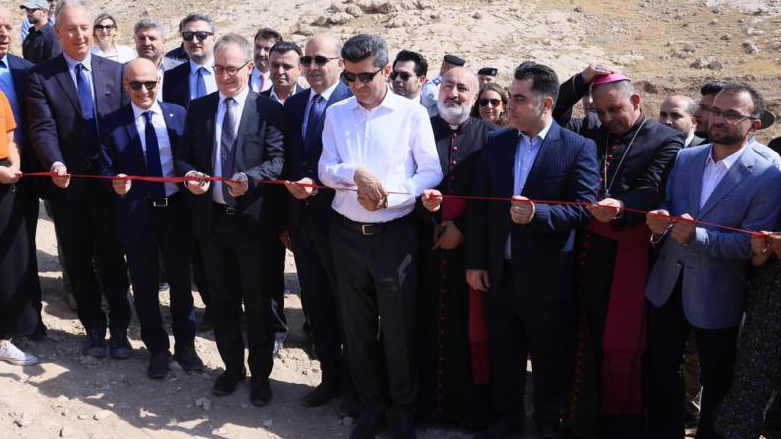First archeological park opens in Duhok

ERBIL (Kurdistan 24) – Kurdish and Italian officials on Sunday opened the first archeological park in Iraq in Faida in the Duhok province. Moreover, UNESCO officials were present at the inauguration.
Duhok.. 1St Archeological Park In Iraq Inaugurated
— Ministry of Municipality & Tourism/ KRG (@momt_krg) October 16, 2022
1st Archeological Park inaugurated in Faida during a ceremony attended by Minister of @momt_krg @SasanAwny, Amb. #Greganti, Consul #Camerota, Director #AICS #Cabasino. The Project is led by #UniUd with support #AICS #ItalyinIraq pic.twitter.com/0aWMikpyJZ
The Kurdistan Regional Government (KRG) Minister of Municipalities and Tourism, Sasan Awny, the Italian Consul General Michele Camerota, and the Italian ambassador to Iraq Maurizio Greganti participated in the inauguration of the archeological park.
The Ministry of Municipalities and Tourism in a tweet said the project is led by the University of Udine and with support from Italian Agency for Development Cooperation (AICS) and the Italian consulate.
Amb #Greganti con Console #Camerota e Direttore #AICS #Cabasino a #Faida sul sito dove sorgerà il primo Parco Archeologico dell'Iraq, guidati dall'ideatore del progetto Prof. #Morandi #UniUd con supporto #AICS #ItalyinIraq pic.twitter.com/pBkKHiN2u0
— Italy in KRI (@ItalyinKRI) October 16, 2022
Moreover, the Ministry of Municipalities and Tourism said on Twitter that "the Park, which is the first of its kind in Iraq and the region, locates in Faida south of Dohuk, and comprises 13 two-meter-height sculptures engraved on its walls dating back to the reign of the Assyrian king Sargon II (705-721 BC) and his son Sennacherib."
Moreover, it said the "Faida Park is one of 5 sites that will be included in the Archaeological Park Project in the future, having a great importance to Iraq in general and to Kurdistan in particular, because it will be an important tourist attraction, in addition of being an economic resource."
The Ministry of Municipalities and Tourism also said these murals were discovered at the Faida site in several stages in recent years, "through excavations carried out by a joint mission of Italian archaeologists from the University of Udine and their counterparts from the KRG Directorate of Antiquities and Heritage of Duhok."
According to the website of the University of Udine, the "Kurdish-Italian Faida Archaeological Project" (KIFAP) was launched in 2019 to save the extraordinary archaeological Assyrian complex of Faida.

“At about 20 km south from Duhok, at the foot of a calcareous hill, an Assyrian king (probably Sargon II, 720-705 BC) ordered the digging of an almost 7 km long irrigation canal," the site says.
"On the rock constituting the eastern side of this canal, at least twelve bas-relief panels were engraved representing the monarch at the extremity of a procession of seven statues of deities standing on bases laid on the back of symbolic animals,” the site added.
